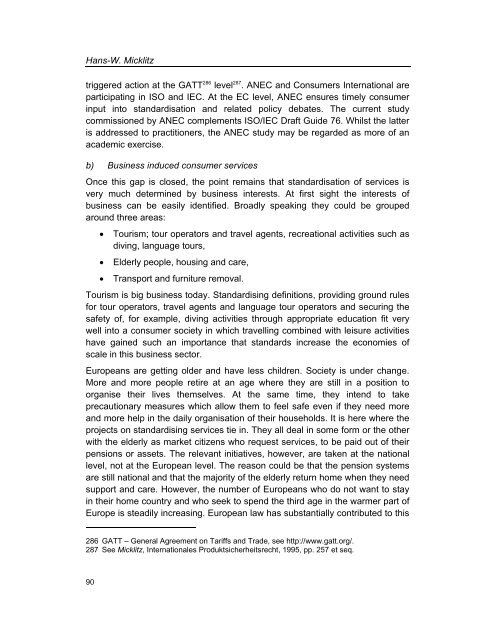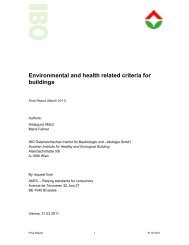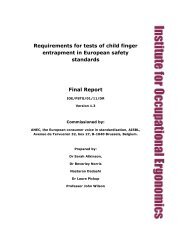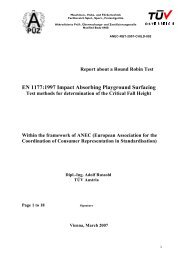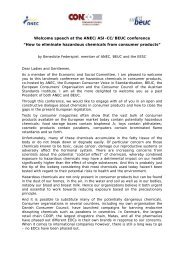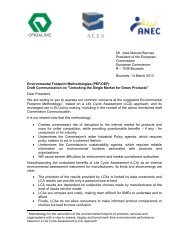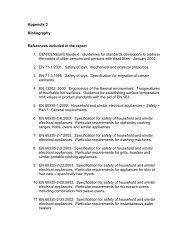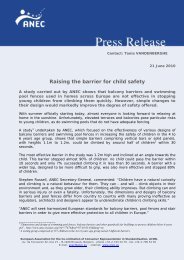Services Standards: Defining the Core Consumer Elements ... - ANEC
Services Standards: Defining the Core Consumer Elements ... - ANEC
Services Standards: Defining the Core Consumer Elements ... - ANEC
Create successful ePaper yourself
Turn your PDF publications into a flip-book with our unique Google optimized e-Paper software.
Hans-W. Micklitz<br />
triggered action at <strong>the</strong> GATT 286 level 287 . <strong>ANEC</strong> and <strong>Consumer</strong>s International are<br />
participating in ISO and IEC. At <strong>the</strong> EC level, <strong>ANEC</strong> ensures timely consumer<br />
input into standardisation and related policy debates. The current study<br />
commissioned by <strong>ANEC</strong> complements ISO/IEC Draft Guide 76. Whilst <strong>the</strong> latter<br />
is addressed to practitioners, <strong>the</strong> <strong>ANEC</strong> study may be regarded as more of an<br />
academic exercise.<br />
b) Business induced consumer services<br />
Once this gap is closed, <strong>the</strong> point remains that standardisation of services is<br />
very much determined by business interests. At first sight <strong>the</strong> interests of<br />
business can be easily identified. Broadly speaking <strong>the</strong>y could be grouped<br />
around three areas:<br />
• Tourism; tour operators and travel agents, recreational activities such as<br />
diving, language tours,<br />
• Elderly people, housing and care,<br />
• Transport and furniture removal.<br />
Tourism is big business today. Standardising definitions, providing ground rules<br />
for tour operators, travel agents and language tour operators and securing <strong>the</strong><br />
safety of, for example, diving activities through appropriate education fit very<br />
well into a consumer society in which travelling combined with leisure activities<br />
have gained such an importance that standards increase <strong>the</strong> economies of<br />
scale in this business sector.<br />
Europeans are getting older and have less children. Society is under change.<br />
More and more people retire at an age where <strong>the</strong>y are still in a position to<br />
organise <strong>the</strong>ir lives <strong>the</strong>mselves. At <strong>the</strong> same time, <strong>the</strong>y intend to take<br />
precautionary measures which allow <strong>the</strong>m to feel safe even if <strong>the</strong>y need more<br />
and more help in <strong>the</strong> daily organisation of <strong>the</strong>ir households. It is here where <strong>the</strong><br />
projects on standardising services tie in. They all deal in some form or <strong>the</strong> o<strong>the</strong>r<br />
with <strong>the</strong> elderly as market citizens who request services, to be paid out of <strong>the</strong>ir<br />
pensions or assets. The relevant initiatives, however, are taken at <strong>the</strong> national<br />
level, not at <strong>the</strong> European level. The reason could be that <strong>the</strong> pension systems<br />
are still national and that <strong>the</strong> majority of <strong>the</strong> elderly return home when <strong>the</strong>y need<br />
support and care. However, <strong>the</strong> number of Europeans who do not want to stay<br />
in <strong>the</strong>ir home country and who seek to spend <strong>the</strong> third age in <strong>the</strong> warmer part of<br />
Europe is steadily increasing. European law has substantially contributed to this<br />
286 GATT – General Agreement on Tariffs and Trade, see http://www.gatt.org/.<br />
287 See Micklitz, Internationales Produktsicherheitsrecht, 1995, pp. 257 et seq.<br />
90


